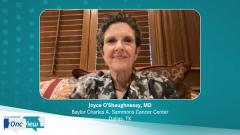
Discussing Treatment and Management Strategies with Patients in the HER2-Positive Setting
Advice for clinicians on how to discuss treatment and management strategies with patients with HER2-postitive breast cancer.
Joyce O’Shaughnessy, MD: When patients are diagnosed with HER2-positive breast cancer in the early stage they really are looking for information about what's the best treatment option that's going to get them the best chances of being cured of this breast cancer while living out their life cancer free. So they really would just wonder what's the optimal treatment, what are the logistics around that? What do I expect with regard to toxicities efficacy? What are my chances of being cured in living out the remaining of my life cancer free, what are the logistics? How much time am I going to have to take away from my family, from my work, will I be able to continue working et cetera, these are all the important questions that patients have. In the metastatic setting, unfortunately, we don't have curative therapy for the vast majority of patients. Patients, again, want to know what's the best therapy for them in terms of length of life. They want to obviously live as long as possible. They also want to live well. They want to live with good quality of life, so they want to know what the best treatment options are for them at every moment in time, along the metastatic journey, they want the best treatment. They want the least toxic treatment. However, they want to know again, efficacy toxicity, how much time I'll have to be in the cancer center to get my treatment done et cetera. So they just really want realistic expectations about what this therapy is going to entail with regard to other important aspects of their lives. So when patients are going to be receiving trastuzumab and pertuzumab I will talk to them about the IV versus the subcutaneous formulations. This can be in the preoperative setting when they're getting chemotherapy in the postoperative setting in the early-stage disease, if they've had a pathologic complete response and just then need to get trastuzumab and pertuzumab to finish out the year of therapy and also in the metastatic setting, whether they're getting the trastuzumab/pertuzumab with the taxane first line or whether they finished the taxane. And now they're continuing on maintenance, trastuzumab and pertuzumab. I talk to the patients about the fact that we have two choices IV or subcutaneous. I just basically tell the patients that I recommend that they get the subcutaneous formulation. It's equally efficacious, it's equally safe, and it just saves quite a bit of time for patients and in the curative setting, if patients have had a pathologic complete response and they're finishing up their year of trastuzumab and pertuzumab, they're doing really well. They can go ahead and get the portacath removed. In the metastatic setting, if patients have been on trastuzumab and pertuzumab for many years, they remain without evidence of disease. Things are really looking good for them that the trastuzumab and pertuzumab is going to keep that disease in control for a very long period of time. A woman also has a choice of having the portacath removed. So this is great for patients to not have to have a portacath and to be able to just come in every three weeks to get a five-minute injection of a subcutaneous formulation, the women are always very excited and very, very happy to have a subcutaneous formulation as opposed to an IV treatment.
In my practice, when I'm talking to patients about various treatment options and we're deciding together on what the treatment will look like going forward, I give patients a lot of information myself. I actually tend to write everything down for patients while we're talking, and then I give them those papers. In our practice, we have information sheets on each of the agents we're recommending to patients and so that's mainly the information I give patients. Very few patients want more information than that. I think a lot of people do their own online research and they'll look at what their doctors have recommended versus what's really recommended online with the various treatment guidelines. There's a proportion of patients that will do their own internet searching, if you will. But I think most patients in my practice, I give them information. What I recommend, I write it down. We give them additional hard copy information about the agents and that usually suffices for what the patients need.
Newsletter
Stay up to date on recent advances in the multidisciplinary approach to cancer.
































